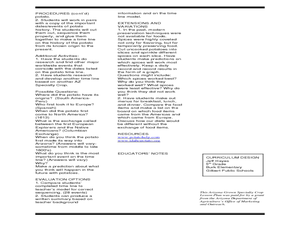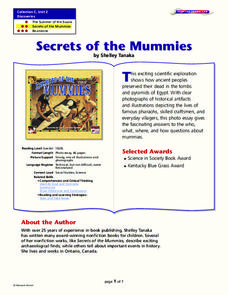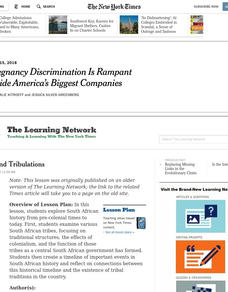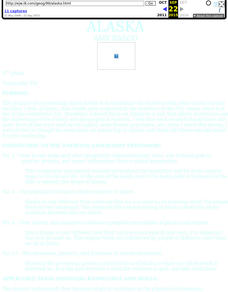Curated OER
Honduras Finding the Top Bananas
Eighth graders complete an online scavenger hunt about banana cultivation before they visit a grocery store to examine banana products. They investigate "certified" means in relation to banana production and read the "Rainforest Alliance...
Curated OER
An Introduction to Modern Economics
Practice reading comprehension with this informational economics worksheet. Learners read a 2-page explanation of the beginnings of modern economics and how it plays a role in society. This reading discusses natural, human and capital...
Curated OER
Delaware Challenge
In this Delaware instructional activity, students answer multiple choice questions about Delaware's famous people, places, and history. Students answer 10 questions.
Curated OER
The Story of English
Explore the history and scope of the English language with this presentation. With discussion points on the roots of English, its various forms around the world, and its status as a global language, this slide show would be a good...
Curated OER
Artifacts 2: Artifacts in Context
Learners will explore an archaeological mystery that demonstrates the importance of context in learning from artifacts. Factors such as the artifact's location, its proximity to other artifacts, and the number of similar artifacts found...
Curated OER
Civil War Trading Cards
Students research important figures in the American Civil War. In this research skills lesson, students create trading cards about selected key figures in the war that list details about the figures and their accomplishments.
Curated OER
Secondary Citizenship: The Importance of Volunteering
Eleventh graders define the word citizenship and explain what they think Dr. Langstaff meant by the question "Are you being a good citizen?" They are asked if they are active citizens. Students list acts they consider to be...
Curated OER
The Phoenicians and the Beginnings of the Alphabet
Students research the history of the alphabet and the Phoenician people. In this alphabet history instructional activity, students view images of Phoenician ships and discuss their trading abilities. Students view various locations on a...
Curated OER
Wales
Students read passages and look online to discover the history and important people, culture, and icons of Wales. In this Wales lesson plan, students participate in a jigsaw reading and learn a few phrases in Welsh.
Curated OER
People of the Desert
Learners study the importance of caring for desert water sources. In this desert lesson, students investigate water resources that are available in deserts. They listen to a read aloud about the Sonoran Desert before working in groups...
Curated OER
Arizona!! How the Heck Did I End Up Here???
Learners research the historical background of the potato. In this potato research lesson, students cut out the important dates in potato history. Learners make a timeline for the events.
Curated OER
Child Labor in America
Students interpret historical evidence presented in primary and secondary sources. In this child labor lesson, students examine the issue of child labor and determine how citizen action prompted...
Curated OER
Secrets of the Mummies
How did the ancient people of Egypt preserve their dead so well that their bodies are still recognizable today? Learn the painstakingly complex process they used for preservation. Young scholars read and summarize a narrative detailing...
Curated OER
The Legacy of Margaret Thatcher: The Iron Lady
In the wake of her recent passing, spend some time acquainting your class with the life of a woman who was highly influential in politics.
Crafting Freedom
George Moses Horton: Crafting Virtual Freedom Through Poetry
What is "virtual freedom"? How about "enslaved entrepreneurship"? Class members will learn about these terms and much more as they read the poems and examine the life of George Moses Horton.
Curated OER
Ancient Camel History "Cloze" Page
In this ancient camel history worksheet, students complete a cloze activity in which 7 words from a word bank are inserted into a factual text. This is to be used with an information handout that is not included here.
Curated OER
Record Memories of Earlier Times
Students identify ways in which the women's rights movement influenced a woman they know, and then document the important events in her life. Each student interviews an oldere woman. They compile their interviews into a class book.
Curated OER
Letter Writing and Abigail Adams
Third graders learn the importance of letter writing for communication. In this letter writing lesson, 3rd graders identify how letter writing was important in the life of Abigail Adams. Students understand what a primary source is and...
Curated OER
The Civil Rights Movement
Students learn about the civil rights movement and create a timeline to understand events in chronological order. For this history lesson, students work in groups to choose one activist from the Civil Right era to research. Students then...
Curated OER
Rites of Passage
Students, through video and Internet activities, are exposed to rites of passage in two modern day West African cultures, the Fulani and the Dogon, and how slavery served as a rite of passage for many West African people in the past.
Curated OER
Tribes And Tribulations
Students explore South African history from pre-colonial times to today. They create a timeline of important events in South African history and reflect on connections between this timeline and the existence of tribal traditions in the...
Curated OER
Alaska
Students describe and explain variations in Alaska's physical environment including climate, landforms, natural resources and natural hazards and compare how people in different communities adapt to or modify the physical environment.
Curated OER
FAMOUS NAMES
Learners study some important people and events in French culture. They complete a worksheet and circle every item that is associated with France. They respond to written cues identifying the country's language and culture.
Curated OER
Alaska
Fourth graders explore how humans adapt to variations in physical environment, compare how people in different communities adapt to or modify the physical environment and identify and compare the human characteristics of selected regions.

























